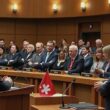German State Premier Urges Swift Disbursement of Funds for Infrastructure Projects
North Rhine-Westphalia’s Minister-President, Hendrik Wüst, is pushing the federal government to disburse the 100 billion euros allocated for the states as soon as possible, as part of the special fund for infrastructure. He warns of the potential for extensive federal control over the disbursement process.
“It’s now a matter of getting the special fund for infrastructure on the move quickly, so that people can see that the money is being spent on sensible projects” the Minister-President told the Welt am Sonntag. The funds should be made available in schools, kindergartens, hospitals, on road construction and at universities. “The initial proposals from the Federal Ministry of Finance, however, have alarmed me and other state premiers. The Federal Ministry of Finance has planned a very bureaucratic approach.”
Wüst demands “simple and bureaucratic-free procedures” and stresses that the funds must be made available to the states without hindrance, so that they can work together with the municipalities to implement the necessary measures. “We need to ensure that the necessary measures are implemented without the control bureaucracy of the federal government.”
The North Rhine-Westphalian Minister-President notes that the western German states, including North Rhine-Westphalia, have a significant backlog to make up for. “Over the past 30 years, the municipalities in North Rhine-Westphalia have paid out 250 billion euros in social benefits in accordance with federal social laws. Our municipalities here have paid a communal solidarity of 15 billion euros to cover the consequences of socialism in the new states. Meanwhile, the municipal debts of our municipalities have risen to 19 billion euros. Whoever has such high debts does not invest anymore. In that sense, it is clear: Now it’s the West’s turn.”
Looking at the demands of the eastern German states and the financial needs there, Wüst said, “One cannot deny that many historic city centers in the East have been brought into a good condition. How much money has flowed into new streets, bridges and buildings there. That is a good and sensible thing. However, there are now shifts in the needs.”
The CDU politician also warns the federal government to participate more financially in legislative initiatives of the federal government in the future. “It’s about implementing what is in the coalition agreement of CDU, CSU and SPD: ‘Who orders, pays'” Wüst told the newspaper. There should be a financial compensation for federal projects that the states have to implement, for example through value-added tax points, as the Basic Law foresees a way for this.
“It’s about ending the eternal haggling over every single law and establishing a reliable mechanism.” The clever arrangement in the coalition agreement was the basis for many state representatives to agree to the overall package. “I can hardly imagine that the federal government would like to break its central promise at the beginning of the legislative period. I can only warn against this, at any rate” the Minister-President said.





